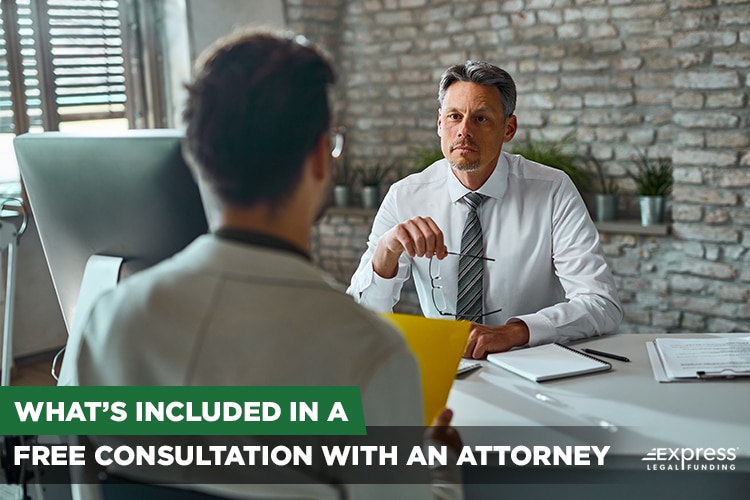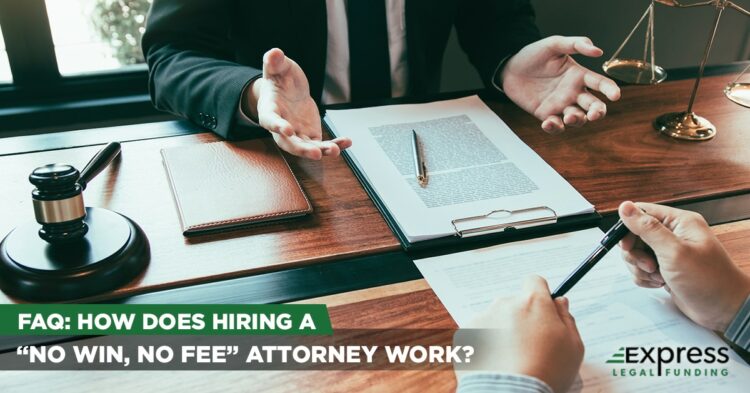
Many types of lawyers commonly use free initial consultations to build trust and evaluate clients’ cases before getting retained.
In this guide, learn why lawyers offer these consultations (hearing from real attorneys with examples), explore 15 questions clients should ask in a free consultation with an attorney, what to expect during the meeting, and how it benefits both parties.
Free initial consults are a great way to attract clients, enabling attorneys to create a positive first impression, foster client confidence, and lay the groundwork for a productive attorney-client relationship, all of which are critical to having a successful law practice.
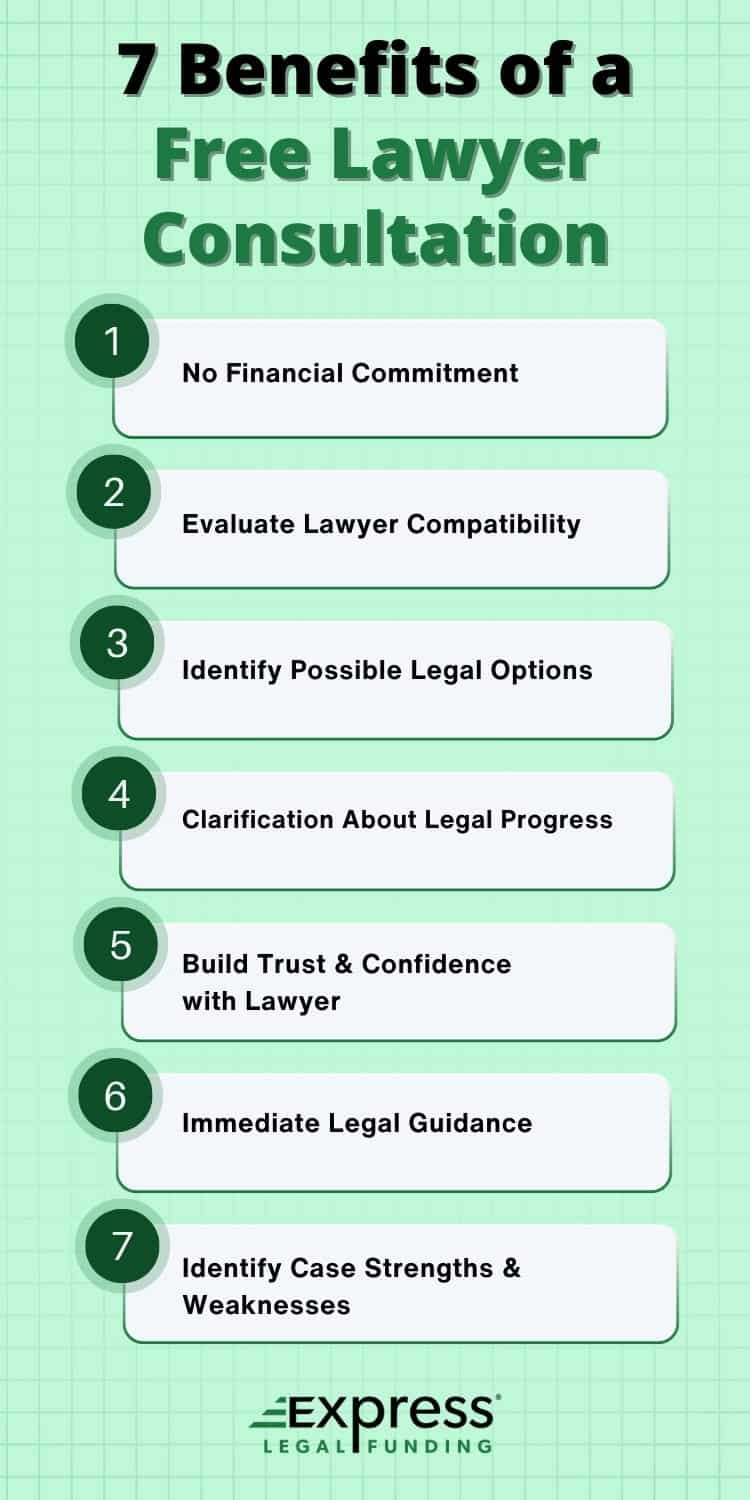
At its core, an effective legal consultation ensures that potential clients feel heard and valued while allowing lawyers to assess the case’s prospects and determine if they align with their areas of expertise.
To begin, let’s clarify the purpose and benefits of a free consultation with a lawyer by concisely answering why lawyers offer these consults to prospective clients.
Why do Attorneys Offer Free Initial Consultations?
The purpose of a free initial consultation with a lawyer is to provide both the attorney and the potential client with an opportunity to evaluate whether they are a good fit to work together.
It allows the lawyer to understand the client’s legal needs, offer a preliminary assessment of their case, and outline possible next steps.
It is an opportunity for the client to gauge the lawyer’s expertise, approach, and compatibility without any financial commitment, helping them make an informed decision about proceeding with legal representation.
What to ask a lawyer during a consultation?
Questions to Ask a Lawyer During a Consultation:
- What is your experience with cases like mine?
- What are the possible outcomes of my case?
- What strategy would you recommend for my case?
- What will the legal process involve?
- How do you charge for your services?
- Are there any additional costs I should be aware of?
- How will you communicate with me throughout the case?
- What is your approach to negotiation and settlement?
- Who will be handling my case?
- What are the risks involved in my case?
- How long do you expect my case to take?
- What can I do to help my case?
- Do you have client testimonials or reviews?
- What is your success rate with cases like mine?
- What will be the next steps if I decide to hire you as my lawyer?
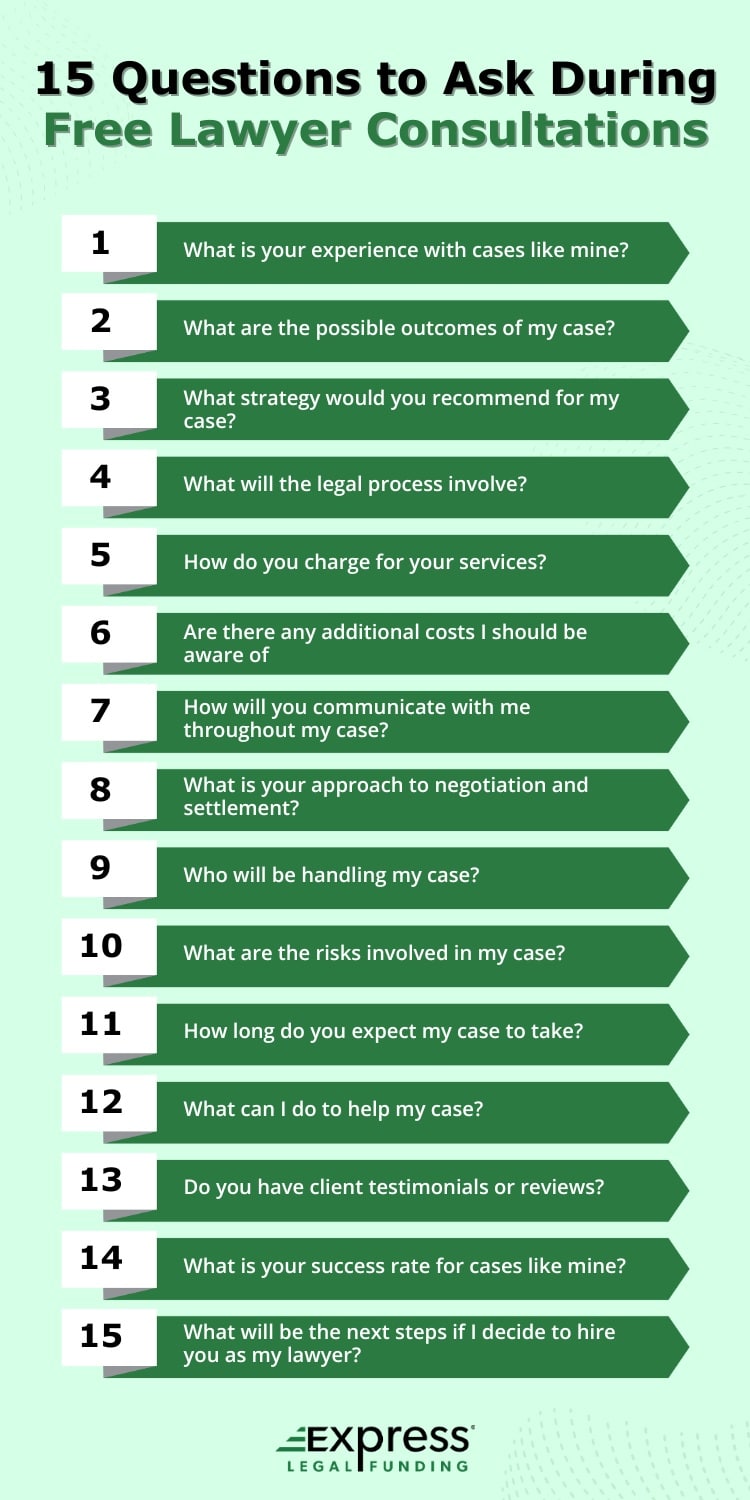
The following are the essential questions to ask a lawyer during a consultation, with explanations of their importance:
1 – What is Your Experience with Cases Like Mine?
Why ask this? It’s how you can gauge the lawyer’s expertise and familiarity with cases similar to yours. It helps you understand if they have a proven track record in handling your specific type of legal matter.
2 – What Are the Possible Outcomes of My Case?
Why ask this? It will give you a realistic understanding of what to expect, including best-case and worst-case scenarios. It can also reveal how the lawyer evaluates your case’s strengths and weaknesses.
3 – What Strategy Would You Recommend for My Case?
Why ask this? The answer will help you learn about the lawyer’s approach and whether it aligns with your expectations and needs. These details can also help you assess their analytical skills and problem-solving abilities.

4 – What Will the Legal Process Involve?
Why ask this? It’s how you can understand the steps, timelines, and procedures likely to be involved in your case, from filing documents to court appearances. Knowing these details helps set expectations and prepares you for what lies ahead in the legal process.
5 – How Do You Charge for Your Services?
Why ask this? It’s how you can clarify the lawyer’s fee structure, including hourly rates, flat fees, contingency fees (no win, no pay), or retainer fees. This question helps you assess affordability and avoid any surprises later on.
6 – Are There Any Additional Costs I Should Be Aware Of?
Why ask this? It’s how you can identify potential extra expenses like court fees, expert witness costs, or administrative charges. Understanding the full scope of costs helps you budget, plan financially, and get the best deal.
7 – How Will You Communicate with Me Throughout the Case?
Why ask this? It’s how you know the lawyer’s preferred methods of communication (email, phone, text message, in-person) and frequency of updates.

A clear communication channel with your lawyer is key to staying informed and feeling confident about the progression of your case.
8 – What Is Your Approach to Negotiation and Settlement?
Why ask this? It’s how you learn if the lawyer prefers to settle cases out of court or is willing to go to trial if necessary. This helps you understand their style and whether it matches your preferences.
9 – Who Will Be Handling My Case?
Why ask this? It’s how you confirm if the attorney you meet will handle your case personally or if it will be delegated to a junior associate or paralegal or even referred out to another lawyer whom you will have to hire.
For instance, the interviewing attorney may be planning on seeking a co-counsel fee, which means bringing on another lawyer and dividing the fee charged to you and paid to them.
10 – What Are the Risks Involved in My Case?
Why ask this? It’s how you learn early on about potential challenges or complications that could arise during the legal process.
A transparent lawyer will provide a balanced view of both the opportunities and the risks, as no outcome should be guaranteed at the outset, no matter how strong your case is.
11 – How Long Do You Expect My Case to Take?
Why ask this? It’s how you get a rough estimate of the timeline for your case’s resolution. This helps you manage expectations regarding how long the legal process may take and is another way to identify whether the lawyer has prior experience handling your case type.
12 – What Can I Do to Help My Case?
Why ask this? It’s how you find out if there are specific actions you should take or documents you should provide as evidence to strengthen your case. It demonstrates your willingness to be proactive and collaborative and not make the attorney’s job more difficult.
13 – Do You Have Client Testimonials or Reviews?
Why ask this? Reading or watching positive client testimonials or online ratings can help you feel more confident in your choice of attorney (or help you know to look elsewhere).
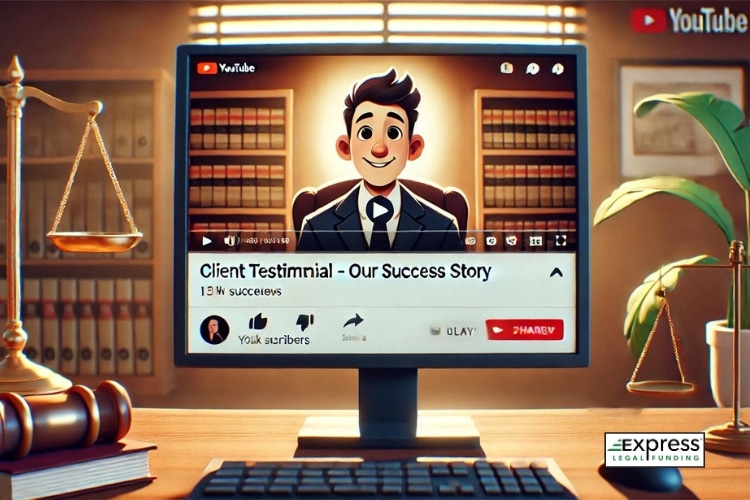
Both are forms of social proof and ways to confirm a lawyer’s competency and ability to handle your legal matter.
14 – What is Your Success Rate with Cases Like Mine?
Why ask this? It’s how you understand how often a lawyer achieves favorable outcomes for clients in similar cases.

This helps you assess their ability to handle your legal matter effectively and is also an opportunity for them to explain what reasonable expectations are.
15 – What Will Be the Next Steps if I Decide to Hire You as My Lawyer?
Why ask this? It’s how you will know the immediate actions that will be taken if you proceed with hiring the lawyer. This also helps set clear expectations for both parties, informs you what you must do as the client to hire them, and provides a roadmap for what comes next.
Key Benefits of a Free Initial Consultation and Case Evaluation with a Lawyer:
- No Financial Commitment: Clients can explore their legal options without any upfront costs or obligations, making it easier and free to determine whether to pursue legal action or not.
- Evaluate Lawyer Compatibility: A consultation acts as a job interview, allowing potential clients to gauge a lawyer’s experience level, personality, communication style, and approach to ensure a good fit.
- Understand Legal Options: Clients receive preliminary legal advice, including an overview of potential strategies, likely outcomes, and next steps for their case.
- Clarify the Legal Process: It helps clients understand what to expect during the legal process, including timelines, costs, and the lawyer’s role.
- Build Trust and Confidence: Clients can gauge the lawyer’s dedication, professionalism, and ability to handle their case, fostering trust and confidence in moving forward.
- Receive Immediate Guidance: Clients can get answers to their pressing questions and immediate guidance on handling their legal situation effectively.
- Identify Case Strengths and Weaknesses: Lawyers provide a preliminary assessment of the case, highlighting any strengths or weaknesses that could affect the outcome.
Real Attorney Insights: Benefits & Methods of Handling Free Lawyer Consultations
To provide real examples and improve context, our team gathered the following insights and quotes from practicing lawyers who conduct free client consultations:
Build Rapport with Free Initial Consultations
As a solo practitioner for 40 years, I’ve always offered free initial consultations. This approach builds rapport and gives insight into client needs. I ask questions to understand key details and then provide customized next steps.
For example, a client couldn’t get workers’ comp for an injury. Our consultation revealed complexity requiring expert evidence. While challenges loomed, I laid out a strategy to overcome them. Months later, we won a settlement for medical and living expenses so he could move forward.
Free consultations benefit both parties. Clients get answers and feel heard. I evaluate merits and fit.
If not a good fit, it’s best to know upfront before wasting time or money. But when it is, we start from understanding, leading to the best outcome. My role is to educate, advocate, and help clients steer through difficult experiences. An open conversation ensures I provide the responsive guidance they need.

David Fritch, Attorney, Fritch Law Office
Establish Trust with Informative Meetings
When structuring free client consultations, my approach is to ensure the meeting is as informative and productive as possible for both the client and myself. I begin by setting clear expectations at the outset.
Typically, I allocate about 30 minutes to the consultation, which is enough time to get a thorough understanding of the client’s situation without overwhelming them with too much information.
The consultation starts with a brief introduction, in which I explain who I am, my background, and the areas of law that I specialize in. This helps build rapport and trust, which are crucial in establishing a strong attorney-client relationship.
Next, I ask the client to describe their legal issue in their own words. I listen carefully, take notes, and make sure to ask clarifying questions to fully understand the context and details of their situation.
I structure the consultation in this way because it allows the client to feel heard and understood, which is essential in building trust and ensuring they are comfortable with me as their potential legal representative.Additionally, it gives me the necessary information to assess the case’s merits and determine if it is something I can assist with effectively.
After gathering the necessary information, I provide a preliminary assessment of the case. I explain the relevant legal principles, potential challenges, and possible outcomes.This is done in straightforward, non-legal jargon to ensure the client fully understands their situation. I also outline the next steps, whether that involves gathering more information, filing documents, or other legal actions.
I conclude the consultation by discussing my fee structure and what the client can expect if they choose to move forward with my services. I ensure that I leave time for any questions they may have, which allows them to feel more confident in their decision-making process.
The reasoning behind this consultation structure is multifaceted:
- It ensures the client feels valued and understood, which is crucial in a field where clients often come with high levels of anxiety and uncertainty.
- It allows me to quickly determine if the case is a good fit for my expertise, which saves time for both the client and myself.
- By providing a clear, concise overview of the legal landscape they are facing, I empower the client to make an informed decision about how to proceed.

Rock Rocheleau, Founder & Attorney, Right Lawyers
Comprehensive Approach to Estate Law Consultations
We approach our free client consultations with a commitment to thoroughness and clarity. We start by diving into the specifics of the client’s situation. This entails a thorough discussion in which we encourage clients to describe their family structure, financial situation, and any specific estate-related concerns.
This allows us to gain a comprehensive understanding of their unique circumstances, such as whether they have dependents with special needs or specific asset preferences.
Once we’ve gathered the necessary background information, we move into a detailed explanation of their legal options.
Here, we not only outline the different estate planning tools available—such as trusts, wills, and powers of attorney—but also discuss the advantages and limitations of each based on their particular needs.We make sure to explain the potential tax implications and how different decisions might impact their estate and beneficiaries. This ensures that clients understand the practical implications of their choices and can make decisions that align with their long-term goals.
We then address any specific questions or uncertainties the client may have. This interactive segment is where we clear up any doubts and provide additional information tailored to their needs. We can discuss how specific legal scenarios may play out or provide further details on the process involved in drafting and executing their estate plan.
This step is crucial in building a solid rapport and ensuring clients feel informed and reassured about the next steps. Our goal is to make sure that by the end of the consultation, clients have a clear understanding of their options and feel confident about moving forward.
Our comprehensive and client-centered approach lays the groundwork for a solid estate planning strategy.

Oliver Morrisey, Inheritance Lawyer, Owner, Director, Empower Wills & Estate Lawyers
Focus on Client Comfort in Free Consultation for Personal Injury Cases
We take a tailored approach to structuring our free client consultations, and here’s why. We start by setting up a relaxed, no-pressure environment where clients can openly discuss their issues. Our goal is to listen first, so we begin with a broad overview of the client’s situation.
This gives us a chance to understand their needs without diving too quickly into the legal jargon. After gathering the necessary details, we discuss possible strategies and next steps.
This method ensures that clients leave with a clear understanding of their options and how we can assist them. It’s all about making sure they feel heard and informed rather than overwhelmed.
We also keep our consultations free of charge to demonstrate our commitment to helping clients find the proper legal support, even if it means referring them to another professional.
This approach fosters trust and shows that we’re genuinely interested in their best interests, not just our bottom line. It’s our way of giving back to the community and building relationships that are based on transparency and genuine care.

C.L. Mike Schmidt, Personal Injury Lawyer, Schmidt & Clark
Pre-Screen and Guide Client Discussions to Evaluate Worthwhile Cases
In my practice, free client consultations start with an initial phone call where my intake person pre-screens the caller to ensure their case generally fits our criteria—confirming they don’t already have a lawyer, that they were injured, and that they are not at fault. This pre-screening helps us focus on cases where we can make the most impact.
When I meet with the client, I provide a clear roadmap of the topics we’ll discuss, including liability, damages, and any specific client concerns. This structure helps keep the conversation on track, as clients often don’t know what’s relevant.
They might offer too much information out of fear of leaving something out, or conversely, they might omit crucial details without realizing their importance.
By guiding the discussion, I ensure that all relevant information is covered and the client leaves with a clear understanding of the path forward.

Eric Ramos, Personal Injury Attorney, Eric Ramos Law, PLLC
Immediate Attention for Personal Injury Cases
From the moment a potential client reaches out, we aim to provide immediate attention. Accessibility is paramount. I believe that when someone contacts us, it’s often because they’re in a vulnerable position and need prompt assistance.
That’s why we ensure that clients speak directly with an experienced attorney, not a case screener. This fosters a sense of trust and gives clients confidence that their case is being taken seriously right from the beginning. The consultation itself is structured to be comprehensive yet straightforward.
I start by listening to the client’s story and gathering information on how they were injured. This is crucial because each personal injury case is unique, and understanding the nuances early on helps in crafting a tailored strategy.
A free consultation is not only about giving advice; it’s about listening to what this person has gone through, how it’s affected their life, their family, their job, and from that, we can help guide them towards the best solution to get the compensation they deserve.

Lawyer Paul Greenberg, Managing Member, Briskman Briskman & Greenberg
Purposeful Structure for Effective Relationships
As an experienced lawyer, I always structure free client consultations in a very purposeful way. The initial consultation sets the tone for the attorney-client relationship, so it’s essential to use the limited time wisely. I begin by briefly introducing myself and providing some background on my experience. This establishes credibility upfront.
Next, I have the client explain their situation and goals in their own words without interrupting. This shows them I am an engaged, active listener. After they have fully explained their case, I ask clarifying questions to fill in any gaps in my understanding. Gathering all the pertinent facts is crucial.
Only after I have a complete picture of the case do I provide my legal assessment. I explain the relevant laws in plain terms and give my opinion on likely outcomes. If needed, I suggest possible strategies or solutions.
I’m careful not to overpromise, though—managing expectations is critical. I wrap up by summarizing the next steps and asking if they have any remaining questions. Structuring initial consultations in this way ensures clients feel heard and understood. It builds trust in my capabilities and reassures them I have the expertise to handle their case.
A thoughtful, client-focused approach sets the right tone for an effective attorney-client relationship.

Attorney Dan Christensen, Owner, CEO and Founder, DJC Law
Key Takeaways and Common Themes Among Lawyers that Conduct Free Consultations
We will now provide a highlight and easy to grasp analysis of several common themes discussed by the attorneys and their approaches to structuring free initial consultations:
Building Rapport and Trust During Free Consultation
Several attorneys we interviewed emphasized the importance of building rapport and trust from the outset of the free initial consultations.
They achieve this by creating a welcoming, no-pressure environment, actively listening (giving full attention and responding in ways that show understanding) to clients, establishing credibility through introductions, and sharing relevant background information.
For example, attorneys David Fritch and Rock Rocheleau focus on making clients feel heard and valued, helping to establish a strong foundation for the attorney-client relationship.
Providing Clear, Informative Guidance About Legal Processes
A recurring theme among lawyers is the focus on making the consultation informative for the client.

Attorneys say they explain legal principles, potential outcomes, and next steps in straightforward terms to help clients understand their situation and make informed decisions.
This approach involves educating clients about their legal options and explaining relevant laws, potential challenges, and strategies in a way that is accessible and easy to comprehend.
Tailoring the Consultation to Client Legal Needs
Many attorneys highlight the importance of tailoring the consultation to each client’s specific needs and circumstances. This involves asking targeted questions, guiding the conversation to gather relevant information, and providing customized advice.
Lawyers like C.L. Mike Schmidt and Oliver Morrisey emphasize adapting their approach to the client’s unique situation, whether it’s estate planning, personal injury, or another legal matter.
Effective Information Gathering and Case Evaluation
A structured approach to gathering information is a central theme. Attorneys stress the importance of asking clarifying questions and directing the conversation to ensure all pertinent details are covered, which helps in formulating an accurate legal assessment.
As Eric Ramos mentioned, pre-screening clients before the consultation also helps focus the conversation on cases that are a good fit for the firm to handle.
Setting Expectations and Managing Client Understanding for Longterm Satisfaction
Several attorneys note the importance of managing expectations and being transparent about potential outcomes.
This includes discussing the lawyer’s fee structure, legal processes, and likely scenarios, which helps build trust and avoid misunderstandings later on.
Clear communication about the consultation’s purpose, duration, and content is also critical for ensuring clients feel comfortable and informed.
Demonstrating Commitment and Value of Legal Representation
Many attorneys use free consultations to demonstrate their commitment to helping clients, whether through in-depth discussions, immediate attention, or the willingness to refer clients to other professionals if necessary.
As shown by attorneys like Paul Greenberg and C.L. Mike Schmidt’s responses, this approach fosters trust and reassures clients that their interests are the lawyer’s priority.
Purposeful Format to Maximize Effectiveness of Initial Consultations
Lawyers highlight the importance of having a purposeful structure to ensure productive and efficient initial consultations.
This includes outlining the consultation’s flow, covering all relevant topics, and using the limited time wisely to set the tone for a positive attorney-client relationship.
The structure generally includes:
- A clear beginning (introduction).
- Middle (information gathering and assessment).
- End (conclusion with next steps and Q&A).
Balancing Legal Insight with Compassion
Many attorneys emphasize the importance of combining legal expertise with empathy and understanding to best facilitate clients.
During the initial consultations, they listen to clients’ stories and acknowledge their situations’ emotional and personal impacts, helping potential clients feel supported and respected.
In Conclusion About What to Ask During a Free Initial Consultation with a Lawyer
Free initial consultations with a lawyer provide a valuable opportunity for both potential clients and attorneys to explore whether they are a good match for working together.
These meetings allow clients to ask critical questions, understand their legal options, and evaluate the lawyer’s expertise and approach—all without any financial obligation or commitment.
For lawyers, free consultations help build trust, demonstrate their value, and establish a foundation for a productive attorney-client relationship.
Get a Free Consultation With a Top Attorney – Connect with Express Legal Funding Today!
If you’re considering legal action and want to find the right lawyer for your needs, contact Express Legal Funding today.
Our experience as a nationally recognized and trusted pre-settlement funding company has honed our ability to help clients find the best legal counsel possible.
Whether it be car accident or product liability lawyers, we’ve advanced funds to their clients to assist with living expenses during the litigation process, giving us firsthand experience with a myriad of case types.

Alongside Legal Funders for Actually Fair Funding (LFAFF), we have built a trusted nationwide network of proven personal injury attorneys offering free consultations.
Our team of legal and financial industry veterans can connect you with an experienced lawyer who will listen to your concerns, provide valuable insights, and guide you through your legal options—all at no upfront cost to you.
Don’t wait to get the legal support you deserve. Apply with Express Legal Funding now and let us help you find the best licensed attorney nearest you to confidently resolve your legal issues.
📖 Bonus Read: What Is Post-Settlement Funding & How Does It Work?
FAQs: What to Expect During Your Free Initial Consultation with a Lawyer
What is an initial consultation with a lawyer?
An initial consultation is a first meeting between a lawyer and a potential client to discuss the client’s legal issue, evaluate the case, and determine if the lawyer can provide assistance.
Is an initial consultation with a lawyer free?
While many lawyers offer free initial consultations, others may charge a set or hourly fee for the legal consult. It’s essential to clarify this detail before scheduling the meeting.
How long is a free consultation with a lawyer?
Free lawyer consultations typically last between 30 minutes to an hour, but this can vary depending on the complexity and type of the case and the lawyer’s approach.
What questions should I ask during a free legal consultation?
Ask about the lawyer’s experience with similar cases, their approach to handling your case, fee structures, costs involved, and what potential outcomes you can expect, including an estimated timeline.
Can a lawyer refuse to take my case after a free consultation?
Yes, a lawyer can refuse to take your case after a free consultation and should if they believe it is not a good fit, lacks sufficient legal merit, falls outside their area of expertise, or presents a conflict of interest.

